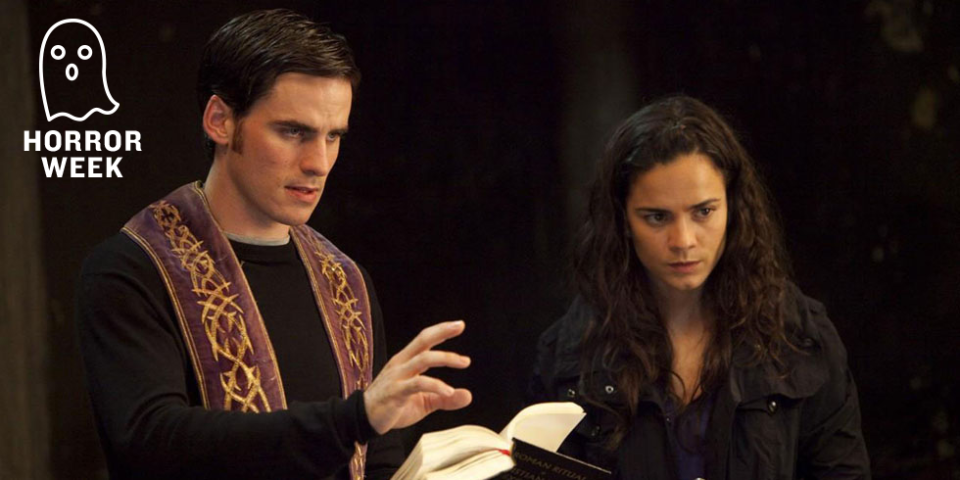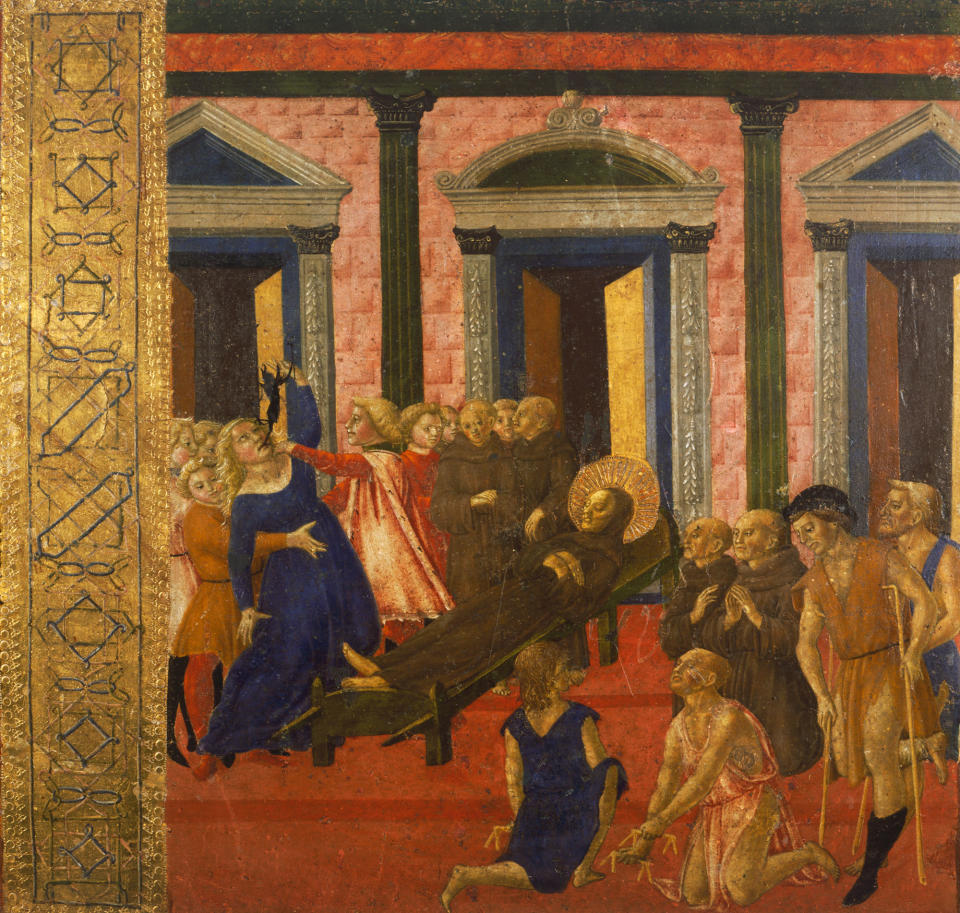What It's Really Like to Be an Exorcist


Any good horror fan knows their genres: You’ve got your torture porn, your J-horror, your creature features, your sci-fi crossovers, and your slasher flicks. But few movies cause as many shockwaves in viewers as the religious ones - like The Exorcist, which had audiences fainting in theaters back in 1973 (and inspired a modern-day TV spin-off last month), or 2012’s The Rite, where a grizzled Anthony Hopkins takes a cocky non-believer through a horror show of Roman possession. So what makes these demonic stories so scary? Perhaps it’s the understanding that, unlike a leather-faced inbred or a taxidermist with mommy issues, Satan really is the biggest baddie you can run up against.
Though horror movies have made exorcism seem like the stuff of fiction, there are still people out there who do them for a living. Father Gary Thomas has been performing exorcisms for more than a decade, working out of the Archdiocese of San Jose. His initial exorcism studies at the Vatican inspired The Rite (he was a consultant on the film) and in the years since, he’s handled over 60 cases of demonic activity. Cosmopolitan.com spoke with Thomas to get a crash course on how an exorcism really unfolds, and while he hasn’t seen any spinning heads or projectile vomit, he would like you to seriously reconsider your habit of dabbling in tarot.
How did you come to be an exorcist? That can’t be something you planned on.
I was always a lifelong Catholic and involved in my parish. After college, I just reached a point in my life where I was drawn to the priesthood, and I served in a variety of capacities in my first 22 years as a priest. After that I asked to take a sabbatical, to go to Rome and study spirituality at the Dominican University. Then, before I went, the bishop appointed me exorcist of the diocese. The first priest he had asked declined, so I spoke up and said, “I can do that.”
How did you know you could do that?
I knew nothing. I just felt compelled. The bishop said, “Well, there’s a course you can take in Rome,” which I took, and that’s where I met Matt Baglio, who wrote a book about my experiences. The classroom experience was all theoretical and theological. Then I found Father Carmine, and he agreed to tutor me, and I worked under him for 3 1/2 months while I was in Rome, observing exorcisms. When you go out in the field, you have the opportunity to actually see the rite and the reactions of the demons to the prayers. Obviously it’s altogether different from the classroom.

I’m surprised they have a class for this.
The church has always performed exorcisms. People in the church will sometimes say, “We don’t do them anymore,” which is absolutely false. In 2004, Pope John Paul II issued a mandate telling every bishop in the world to select a priest and train him to be an exorcist. That was because of growing occult activity, which has reached epidemic proportions.
What kind of occult activity?
All kinds of what I refer to as paganism. People using Ouija boards (which is a conjuring instrument, not a toy), tarot cards, seeking palm readers, seeking mediums, seeking out a witch, performing séances, getting involved in meditations like Reiki, using yoga as a form of power whereby you conjure up false gods - those and a variety of other smatterings. It’s no secret that our society is hungering for spirituality. The problem is where people are seeking it. It’s in all the wrong places.
For many people, Christianity is no longer relevant, so they make up their own morality, their own way of living. Unfortunately, a lot of people are seeking out what we could call divination - artificial forms of trying to discover God. The Israelites in the Old Testament did this and they experienced great calamity as a result of it. The same thing is happening in our culture today.
The culture is becoming increasingly pagan. There’s an organization with chapters all over the United States called the Satanic Temple. They claim they don’t believe in Satan (which I don’t buy) but in fact adhere to a kind of secularism because they perceive religion to be superstitious and oppressive. Now they’re trying to set up organized clubs within public schools where there are Christian clubs. They organize a Black Mass every year, which I find absolutely appalling - a Black Mass is a desecration of the Eucharist. It’s open season on Christians, there’s no doubt about that, in my humble opinion.
How often do you receive requests for exorcisms? Do you handle them all alone?
Yesterday, I got five phone calls. We get several requests a week, and many more than that from outside our diocese, which we try to redirect back locally. And I don’t do any of these by myself. I have a team of medical experts - a clinical psychologist, psychiatrist, and a medical doctor. Then I have a prayer team, and the prayer team does all the discernments, the intakes. These people are evaluated. You only end up doing a formal exorcism when everything else has failed.
How does intake work? Are there predictors of possession?
The first question you ask is, what brought you to an exorcist? What was the tipping point? When did that happen? Have you ever been exposed to the occult? Involved in anything Satanic? What was it like growing up in your home? Have you been under the care of a therapist? Have you ever been a victim of sexual or physical abuse? Emotional abuse?
Abuse is the doorway. That’s a soul wound, and demons are always looking for people with broken relationships or no relationships. That doesn’t mean if a person’s been abused that it’s an absolute slam dunk. It’s when people have been victims of abuse and then get involved in the occult. It’s like putting a bull’s eye on your back. Some have been carrying these wounds around all their life, and in an attempt to get well, people sometimes turn to these pagan ways.
People will persuade them: “Go see this shaman, go see this healer.” It looks benign, but it’s not. The vast majority of people who come to me do not get involved in this stuff in order to connect to Satan but you’re creating an impression of a desire for a relationship. That’s what a possession is - it’s a relationship. And it’s not equal.
How can you tell if someone’s really possessed?
There are six classic signs. The first is an aversion to the sacred. For example, a Catholic could have incredible difficulty receiving the [Eucharist], to the point where it’s burning as she’s consuming it. Another sign would be speaking in a language that they have no competency in. I’ve had people speaking Korean, in Chinese or Russian or Spanish, who have no understanding of those languages. Another is a person exhibiting inordinate strength. We prayed over a woman on Sunday and we needed to have five people holding her down. Another is the knowledge of hidden things, so the demon would begin eliciting information that the person wouldn’t have any access to. Another is foaming at the mouth, and that’s actually a good sign, because you’re seeing the reaction to the prayer, the casting out. The last thing would be a kind of epileptic reaction involved the distortion of the face - histrionic out-of-control movement in the arms and the legs.

So, brass tacks - how do you perform an exorcism?
There’s a set of prayers that we pray right before the exorcism starts. I call them setting-the-table prayers. They establish God’s authority, protect the team, protect the person that’s the subject of the exorcism, and protect the property on which the exorcism is taking place (which is in my parish, in my church, the doors are locked, with a sign that says, “Healing Session in Progress,” because you don’t want someone walking in on this).
Then you anoint the doors with blessed oil so the demon cannot leave. We anoint the person with the Sacrament of the Sick and then begin the solemn rite. It’s done entirely in Latin, and you begin with the litany of saints, followed by scripture, followed by a few words based on the scriptures, and then you address prayers to God, and address prayers to Satan. In between, you can pray the Hail Mary and the Lord’s Prayer.
If the person is clearly reacting, you’ll say: “In the name of the Lord Jesus Christ, what is your name?” The demon doesn’t want me or any exorcist to know its name, because once it’s known, the demon begins to lose its power. Sometimes they’ll have names that are Biblical, like Asmodeus or Baal, or Beelzebub, other times they’ll be called Lust or Anger or Hatred. They’re going to do everything they can to not tell you, but there are only three questions you usually ask the demon: What is your name? How did you get in? When are you leaving? You don’t get into any kind of “Well, I’m kind of curious ... what’s it like to be a demon?”
How do you know it’s over?
If the manifestations stop, you continue the prayer for a time and it’s a judgment call. You rely on the person to say whether the demon’s left - sometimes they’ll say yes, sometimes they’re not sure. We’ve been doing this now for 10 years, so we’re getting pretty good at being able to discern when something has left. But you continue the prayers for a while, because sometimes the demon could go and hide.
We see exorcisms in movies all the time. What should people know about the process that Hollywood might not show?
One thing people get wrong is thinking that Satan does not exist. Satan does exist. That’s why Jesus Christ came, and that’s important. I’m not trying to evangelize you, but this is why I give interviews. I give interviews because there are charlatans out there who will say, “I’ll come and cleanse your house,” and some of these people are just flat-out fakes. But some of these people, they have gifting - they do. They’ve just chosen to use it for the dark side.
Jesus didn’t come just to be a nice guy. His death and resurrection defeated Satan. When I end my talks, I usually say, “Do not be afraid.” I’m not saying I’m some kind of rough and tough guy. I’m not but I’m not afraid. I didn’t know what to expect when I saw those manifestations in Italy but I was not afraid. Satan is not a metaphor. Satan is real. He’d like you to believe he doesn’t exist and that’s his greatest deception. People need to buck up and realize that we’re not the masters of our own destiny. We have to put ourselves at the disposal of God.
All you have to do is look what’s going on the in world and say, “Crap, we can do better than this.” But we’re on a very steep downward path, as a country. I mean look who’s running for president. What kind of choice do you possibly have? Anyway, that’s not what this is about. We’re talking about exorcism.
Follow Jon on Twitter.
You Might Also Like

